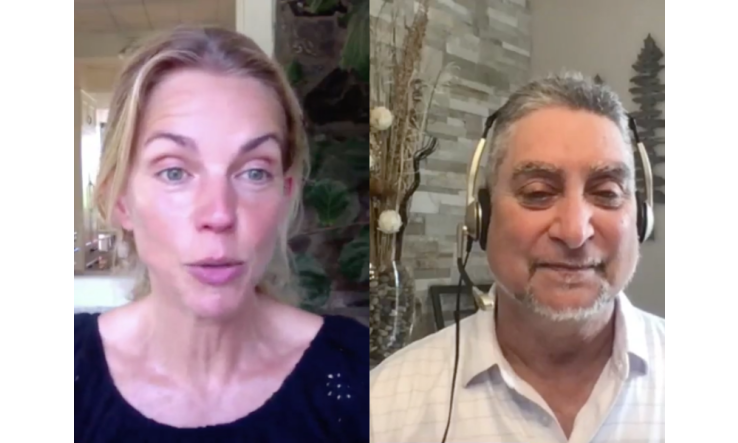Based on your feedback, we have compiled here your natural solutions to relieve, soothe and reverse various symptoms and illnesses.
Live on Friday mornings, Pierre Haddad, pharmacologist and scientific researcher, helps us better understand scientifically, and in all simplicity, these alternatives to relieve and reverse unpleasant conditions in connection with the testimonies we receive.
Here he explains the effect of essential oils on stress and anxiety.
Our meeting on May 24:
Topics covered and transcript of remarks*:
...
21:50 - How do essential oils work?
They will help, for example, to increase neuron growth factors, they will help to maintain, to combat this loss of neurons that we can have, especially with long-term stress. They will act, improve the action of GABA to calm the nervous system and other neurotransmitters. This will modulate that to help, therefore to better manage stress. Finally, there are studies that have shown that essential oils can help to lower cortisol in the blood, therefore the famous stress hormone.
23:00 - Who are they?
And there are several. I have a long list that I found in a review article that talked about aromatherapy in nursing. There are several parts of the plant that can be used: the leaves, the flowers, the bark, when you think of the citrus family, so lemons, oranges, tangerines, etc. This stands out a lot, there are a lot of citrus fruits in calming plants.
There are also woods like Sandalwood and Vetiver resin, which I didn't know about.
Among the leaves there are bay, patchouli and pine (its needles). So, these three will also give soothing, calming effects on the nervous system.
In terms of flowers, there are several: Chamomile, Geranium, Rose, Jasmine, Lavender (obviously, it is the one most associated with a calming effect) and Neroli, which is the leaves of the bitter orange.
24:30 - Three studies on essential oils and stress/anxiety
I wanted to finish, perhaps, with three interesting clinical studies. We talked earlier about the fear of dentists. It's a stress, a real anxiety that many people experience.
There is a summary of 17 clinical studies that were conducted and it was published in 2020. So these are studies prior to 2020. A total of 2,500 patients. It was mainly Lavender, but also Rose and Bitter Orange, that were used in these studies.
Unfortunately, it's difficult because we can't, again, from the point of view of the gold standard of clinical studies with placebo. You can't make a placebo of an essential oil; it's a smell. If we try to reproduce the smell, we put the same molecules that are active, so it's a circle, a catch 22 that we can't undo. So, they use saline vaporization. It's just to say that there is a vaporizer in the room. There are limits, unfortunately, to these studies from the point of view of scientific dogma.
But the majority of studies still found calming effects, meaning that people were less stressed at the doctor's office. And what's interesting is that they compared it with music. Music also has a calming effect. It was as effective as music to have essential oils vaporized in the air of dentists' waiting rooms. So that's an interesting clinical study.
Another study, from 2016, with about forty patients with leukemia. We know that we often have to do bone marrow biopsies to manage the disease, to find out how to treat it, etc. Apparently, it's one of the most painful procedures, which therefore creates a lot of anxiety in patients. They try all sorts of things to manage it, and they worked with bitter orange essential oil. So, I think it was Neroli. They have tests, forms to assess anxiety, but they also looked at the pulse, so the heart rate, the blood pressure. I was saying earlier that there are physical effects: the pressure tends to rise; we have palpitations when we are stressed, anxious; our pulse beats faster, then our blood pressure increases. Neroli essential oil was able to lower the heart rate, lower blood pressure and reduce stress. And they compared it with Valium, a benzodiazepine, which also tends to calm people down. The benzodiazepine, all it did was lower the diastolic pressure (the lower of the two numbers was attenuated). That was the only effect. There was no effect on anxiety. So, bitter orange essential oil was better in this study than the benzodiazepines. So, that's interesting! It doesn't mean that medications aren't useful, but it shows that the essential oil was really active in these patients who were going to have a bone biopsy.
The latest interesting study is on pregnant women during labor, pre-, during, and all three phases of dilation. There too, neroli oil was diffused in the delivery rooms. This helped reduce stress and pain, actually during labor. It involved 88 women and was published just two years ago.
That's a bit, it's not exhaustive as research, but still three cases of different types of stress and anxiety related to different things.
* This live transcript is intended to help you easily find the topics that interest you and the information you are looking for. Maison Jacynthe disclaims all liability. All information contained on this page is not intended to replace justified allopathic treatment or to override the expertise of the medical profession. It is up to each individual to take charge of their own health, to inform themselves, and to make the necessary changes to improve their condition. Therapeutic supervision by a qualified health professional is obviously suggested.




































































Leave a comment